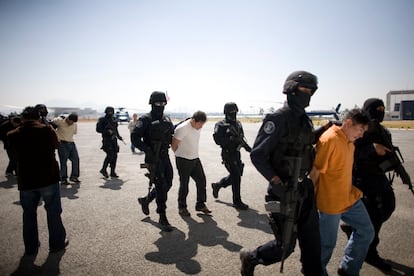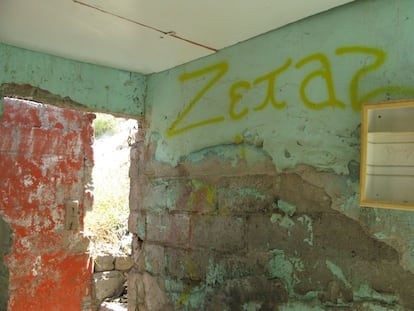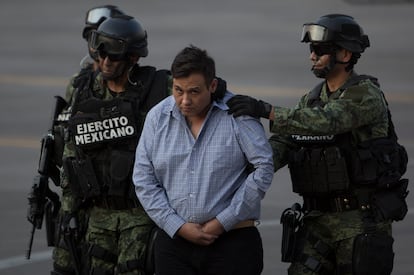US steps up campaign to extradite ‘Z-40’ and ‘Z-42’, leaders of the bloodthirsty Los Zetas cartel
Washington is pushing for the delivery of brothers Miguel Ángel and Omar Treviño Morales and accuses the Mexican judiciary of delaying the process

The United States government is not giving up on its plan to extradite high-profile Mexican drug lords to try them for their crimes and confiscate their illicit wealth. Washington already has in its hands leaders of the Sinaloa Cartel — such as Ismael “El Mayo” Zambada and two of Joaquín “El Chapo” Guzmán’s sons — as well as important members of the Jalisco New Generation Cartel (CJNG), among the son of Nemesio “El Mencho” Oseguera, founder of the criminal group. Now, the U.S. has set its sights on brothers Miguel Ángel and Omar Treviño Morales, “Z-40″ and “Z-42,” respectively, leaders of the violent Los Zetas cartel, renamed the Cartél del Noreste (CDN). Z-40 was arrested in 2013 and Z-42 in 2015. Washington has been seeking their extradition for more than a decade, but in recent weeks it has tightened its grip on the criminal brothers, seeking to prosecute them for drug trafficking into the United States — mainly cocaine — money laundering, and murder.
The U.S. government has accused the Mexican judiciary of delaying the extradition of the brothers, as the process has been bogged down for years in the courts. The Mexican government, in turn, has made it clear that it also has an interest in sending the Los Zetas bosses to the U.S., and has passed the buck to the judges, with whom it has been engaged in a standoff over the controversial judicial reform.
On Wednesday, the U.S. Justice Department issued an indictment against the Treviño Morales brothers, alleging that they have continued to control the cartel from prison by “installing several members of their family to run operations on their behalf.” The document adds that Z-40 and Z-42, aged 51 and 48, respectively, are responsible for “innumerable acts of violence, including murders, assaults, kidnappings and torture.” It says that from 2003 to date, the capos have trafficked 45 tons of cocaine in Mexico, Guatemala, Venezuela, Colombia, and the United States, and that in a period of one year they have made profits of $10 million. At least 14 tons of cocaine have entered the United States alone, according to the indictment.
The extradition of the Los Zetas leaders has become stuck in the Mexican courts. This is largely due to the fact that Miguel Ángel Treviño Morales’ defense alleges that their client is a namesake and that he is being associated with the alias Z-40 due to a mistake on the part the authorities. The defense maintains that the judges have ratified this version and have ordered his acquittal in the cases in which he was accused of organized crime. Miguel Ángel Treviño remains in prison for two other cases pending resolution, related to the crimes of carrying weapons and promoting drug trafficking.

The United States has submitted two extradition requests to Mexico in the case of Z-40, one in 2013, shortly after his capture, and another in 2015. As part of the procedure to extradite a detainee, a federal judge must issue an “opinion” on whether Washington’s request is admissible or not. Without that “judicial opinion,” the Ministry of Foreign Affairs (SRE) — in other words, the government — cannot give the green light to the extradition. The problem is that such a “judicial opinion” has not been issued by the federal court in at least a decade.
The U.S. ambassador to Mexico, Ken Salazar, has openly accused the judiciary of delaying the extradition of Z-40 and Z-42 (he did so in August and again at a press conference Thursday). His criticism is based on the judicial reform that subjects the selection of all judges in Mexico to a popular vote. The amendment has already been approved and is in its implementation phase. The government argues that the reform will rid the judiciary of corruption, in which — it has pointed out— ties of complicity have formed between many judges and drug traffickers or white-collar criminals.
Mexican President Claudia Sheinbaum also attacked the judges for the delay in the case. “Who is protecting them so that they cannot be extradited? The judiciary,” she said during her morning press conference on Thursday. Sheinbaum specified that her predecessor, Andrés Manuel López Obrador, “insisted” on the extradition of the Treviño Morales brothers, but found himself up against a judicial wall. “What is the judiciary doing now with the criminals?” Sheinbaum asked. “There is a justice system and what we want is for corruption to be eradicated everywhere in our country.”

The indictment against Z-40 and Z-42 traces the history of Los Zetas, first as an armed wing of the Gulf Cartel and then as an autonomous crime organization that made violence and terror its hallmark. The document describes how Miguel Ángel Treviño became head of the organization after the death of Heriberto “El Lazca” Lazcano. From then on, it became known as the Cartél del Noreste. After the capture of Z-40 in 2013, Omar Treviño took the reins of the criminal group, until his arrest in 2015. The indictment holds the brothers responsible for the Allende massacre in Coahuila, which occurred in 2011 and in which Los Zetas hitmen murdered dozens of families.
They are also accused of having murdered Mexican officials, police, and military personnel and members of the Gulf Cartel and Los Zetas themselves, as well as representatives of the Guatemalan government. In addition to cocaine, the Treviño Morales brothers are accused of trafficking marijuana to the United States. They are also accused of possessing, transporting, and using firearms, including assault rifles, and of laundering money obtained from their illegal activities using fronts in Mexico and the United States. Washington states in its indictment that, if they are able to extradite them, it will seek the maximum sentence of life imprisonment for Z-40 and Z-42. With judicial officials on strike over the reform, the leaders of Los Zetas continue to buy time.
Sign up for our weekly newsletter to get more English-language news coverage from EL PAÍS USA Edition
Tu suscripción se está usando en otro dispositivo
¿Quieres añadir otro usuario a tu suscripción?
Si continúas leyendo en este dispositivo, no se podrá leer en el otro.
FlechaTu suscripción se está usando en otro dispositivo y solo puedes acceder a EL PAÍS desde un dispositivo a la vez.
Si quieres compartir tu cuenta, cambia tu suscripción a la modalidad Premium, así podrás añadir otro usuario. Cada uno accederá con su propia cuenta de email, lo que os permitirá personalizar vuestra experiencia en EL PAÍS.
¿Tienes una suscripción de empresa? Accede aquí para contratar más cuentas.
En el caso de no saber quién está usando tu cuenta, te recomendamos cambiar tu contraseña aquí.
Si decides continuar compartiendo tu cuenta, este mensaje se mostrará en tu dispositivo y en el de la otra persona que está usando tu cuenta de forma indefinida, afectando a tu experiencia de lectura. Puedes consultar aquí los términos y condiciones de la suscripción digital.









































